The bond between humans and their canine companions stretches back tens of thousands of years, evolving into a partnership so profound it’s believed dogs played a role in our very intellectual growth. For hunters, this ancient alliance finds its deepest expression in the field, where specific Breeds Of Hunting Dogs With Pictures illustrate the incredible diversity and specialized skills these animals bring to the chase. Whether it’s the electrifying sight of a pointer locking onto scent, the powerful retrieve of a Labrador from icy waters, or the urgent chorus of hounds striking a trail, these moments are the heart of the hunting experience.
Hunting with dogs isn’t just about bagging game; it’s a testament to a shared passion, a mutual respect, and an unspoken understanding that transcends species. Dogs possess an unparalleled ability to read our subtle cues, making them indispensable partners. They love the thrill of the hunt as much, if not more, than we do. Their tenacity, courage, and artistry drive us, reminding us to uphold our end of this remarkable partnership. In this comprehensive guide, we celebrate the finest among these dedicated athletes, offering an in-depth look at their unique abilities, histories, and what makes them truly exceptional in the field, accompanied by compelling visuals to showcase each magnificent breed.
Understanding the Essence of Hunting Dog Breeds
Hunting dogs are not a monolithic group; they are a diverse collection of breeds, each developed over centuries to excel in specific hunting roles. From scenting game across vast plains to retrieving fallen birds from dense cover or icy waters, their specializations are as varied as the landscapes they traverse. Understanding these roles is key to appreciating their unique contributions and choosing the right partner for your particular hunting pursuits. For a broader overview of their classifications and purposes, you can explore more about different types of hunting dogs and their specific attributes.
Broadly, hunting dogs can be categorized into several groups:
- Pointers and Setters: Known for their distinctive “point” or “set” stance, indicating the location of upland game birds. They cover vast amounts of ground with high energy and keen noses.
- Retrievers: Specialized in finding and bringing back downed game, particularly waterfowl, from land or water. They are known for their “soft mouths” and unwavering dedication.
- Hounds: Primarily hunt by scent, tracking game such as rabbits, fox, deer, boar, or raccoons over long distances. They are prized for their endurance and vocalizations (baying).
- Spaniels: Versatile flushing and retrieving dogs, often used for upland birds and some waterfowl. They work closer to the hunter, flushing game from cover.
- Curs and Terriers: Often multi-purpose dogs used for tracking, treeing, or controlling vermin. Terriers, in particular, are known for their tenacity in going to ground after quarry.
Each breed within these categories has its own story, its own set of characteristics, and its own enthusiastic following. Let’s dive into the specifics of these remarkable animals.
Top Hunting Dog Breeds: A Detailed Look
Here, we salute some of the very best among the breeds of hunting dogs with pictures, showcasing their unique attributes and why they continue to be cherished partners in the field.
1. Labrador Retriever
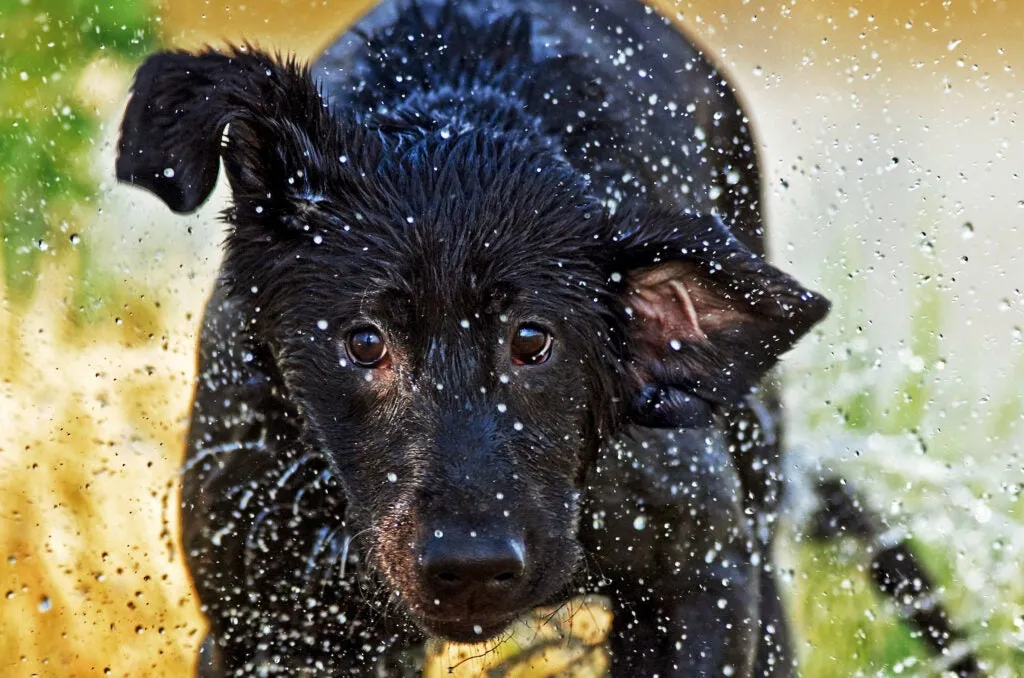 A black Labrador retriever energetically runs through shallow water, creating splashes, with a focused expression as it retrieves game during a hunt.
A black Labrador retriever energetically runs through shallow water, creating splashes, with a focused expression as it retrieves game during a hunt.
When considering breeds of hunting dogs with pictures, the Labrador Retriever often tops the list, and for good reason. While calendars might showcase their adorable puppy antics, hunters cherish a different kind of “cute”: a Lab with a bird firmly in its mouth, coat matted with duckweed, paws caked in mud. What truly melts a hunter’s heart is witnessing a Lab dive tirelessly for a crippled bird 100 yards beyond the farthest decoy, exhibiting an indomitable spirit. As one hunter shared, “I’ve had wet Labs curled up in the backseat, stinking of swamp, too tired to walk—but let that pooch hear the jangle of a duck-call lanyard and there he is, at your side and ready to go. That, my friend, is a dog.”
Despite their name, Labrador Retrievers originated in Newfoundland, where smaller water dogs were crossed with the robust Newfies to create a medium-sized retriever boasting fine legs and a short, water-shedding coat. The second Earl of Malmesbury is credited with importing these “St. John’s water dogs” and naming them Labrador Retrievers, a name that has endured.
Ever since, Labs have been making waves, figuratively and literally. While some Labs display versatile talents—pointing pheasants, flushing quail, or trailing deer and rabbits—their true historical calling lies on the boundary of land and water. Picture them perched on a platform amidst cattails, a torn toe pad from a beaver stick, shivering in the cold, yet their eyes rarely leave the sky. They understand their purpose. Cold and wet, they remain eager for the next retrieve, happy to leap after a bird as many times as their handler commands.
2. Brittany
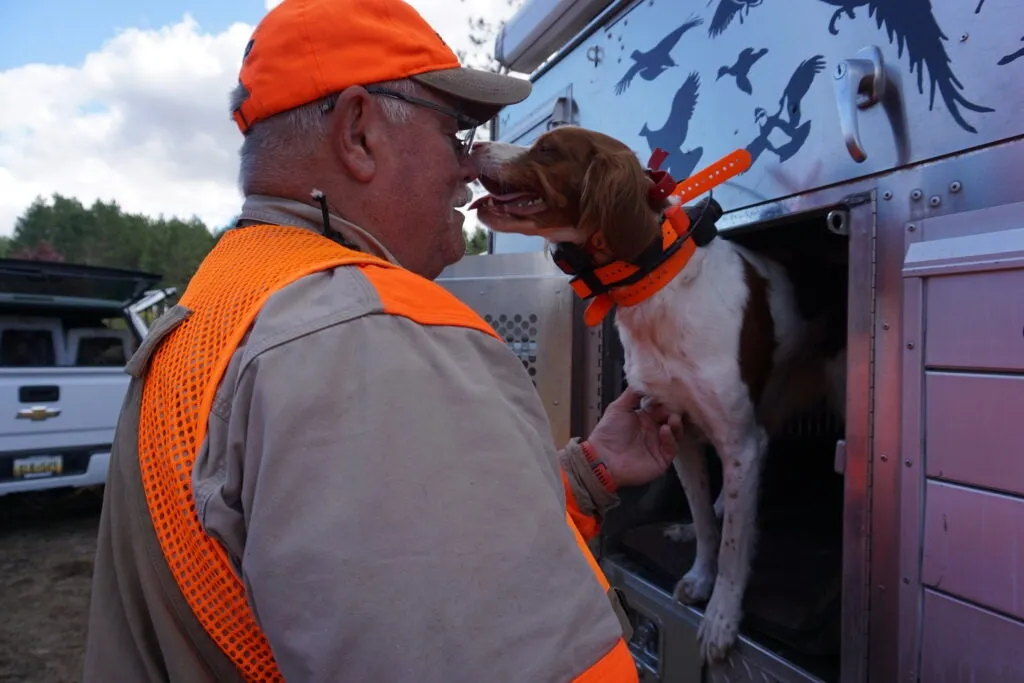 A Brittany stands alert in a wooded area, poised to begin a grouse hunt with its handler.
A Brittany stands alert in a wooded area, poised to begin a grouse hunt with its handler.
Among the beloved breeds of hunting dogs with pictures, the Brittany holds a special place for its remarkable blend of intelligence, compact size, and field prowess. A hunter recounts his experience: “My first Brittany was given to me by a friend 20-plus years ago. I wasn’t thinking of hunting with her at first—but then I started to notice how smart she was. She was remarkable. I started taking her in the woods with me, and I remember how much she loved to chase the turkeys. I had been a hunter years before we got her, but work got so busy that I fell out of touch with it for a few years, but that dog piqued my interest into hunting again. Her name was Pepper. She truly was a gift.”
While not claiming the Brittany as the absolute best hunting dog in the world, many agree there’s something uniquely appealing about this breed. Their manageable size makes them excellent house dogs, capable of spending the week as cherished family members. Yet, come the weekend, they transform into formidable hunting partners, performing tasks typically associated with larger breeds. They are compact dogs, easy to transport and an absolute pleasure to hunt behind when well-trained. The satisfaction of watching a dog you’ve personally trained hold a point, flush a bird, and retrieve it is immense. Kevin Gilmore, owner of Gilmore Brittanys, aptly summarizes their appeal: “She’s a compact dog that you can load into your truck and be with all weekend long. I really like that. And a well-trained Brittany is a pleasure to hunt behind.”
3. English Setter
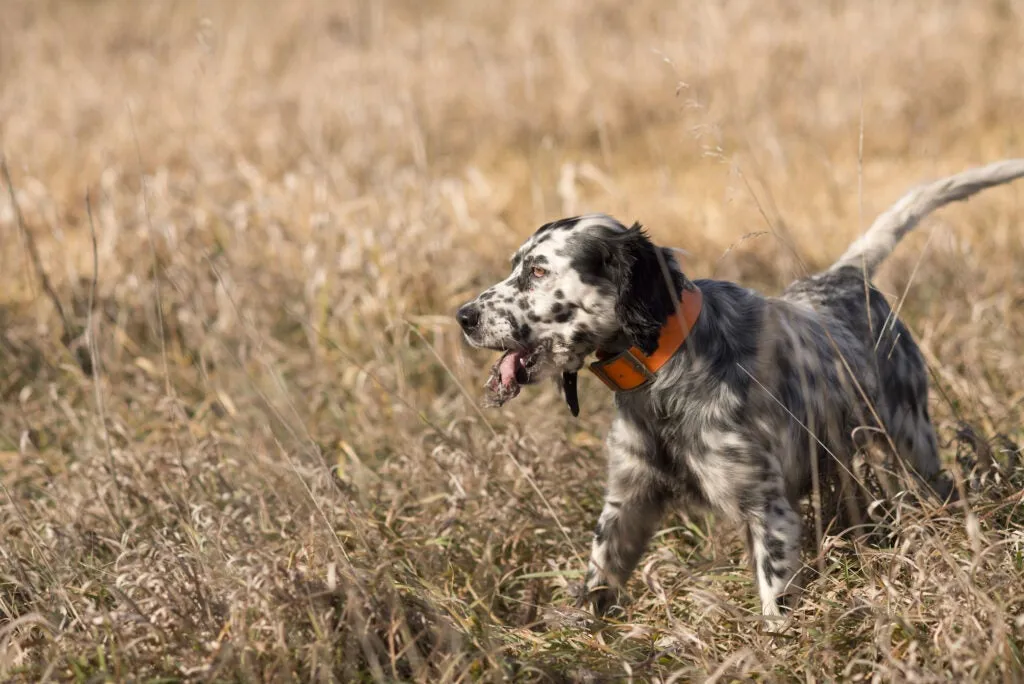 An English setter, mouth full of feathers, stands gracefully in a field, a testament to its hunting prowess.
An English setter, mouth full of feathers, stands gracefully in a field, a testament to its hunting prowess.
The English Setter has inspired more prose and art than perhaps any other among the breeds of hunting dogs with pictures. There’s an undeniable romance to this dog, evoking images of a bygone era of elegant sportsmen. However, describing “the” setter can be challenging due to the breed’s wide variation. You’ll find 80-pound setters with luxurious coats and regal heads, alongside 30-pound setters whose appearance belies their impressive lineage. Some run with the wind, while others maintain a steady trot. Some point with breathtaking style, while others seem to patiently await their quarry. Some are eager-to-please and highly trainable, while others offer a constant challenge.
The consistent truth for aspiring setter hunters is that a philosophical outlook is essential. This breed will test your patience and resolve. Yet, when a setter seamlessly combines its innate talents—running, hunting, and pointing birds with a thrilling intensity that etches itself into your memory—you realize the journey was worth every obstacle.
Tom Davis recalls such a setter, Ernie: “He tracked a running covey of Huns through cover so sparse you’d have sworn it couldn’t hide a mouse. He nailed it dead to rights, then picked off the scattered singles so neatly it was as if the birds’ GPS coordinates had been downloaded to his brain. Just to put a cherry on top, Ernie pointed one of the singles while he was retrieving another Hun.” This kind of performance is why many hunters say a good setter will “spoil you for any other dog.” They truly can.
4. American Foxhound
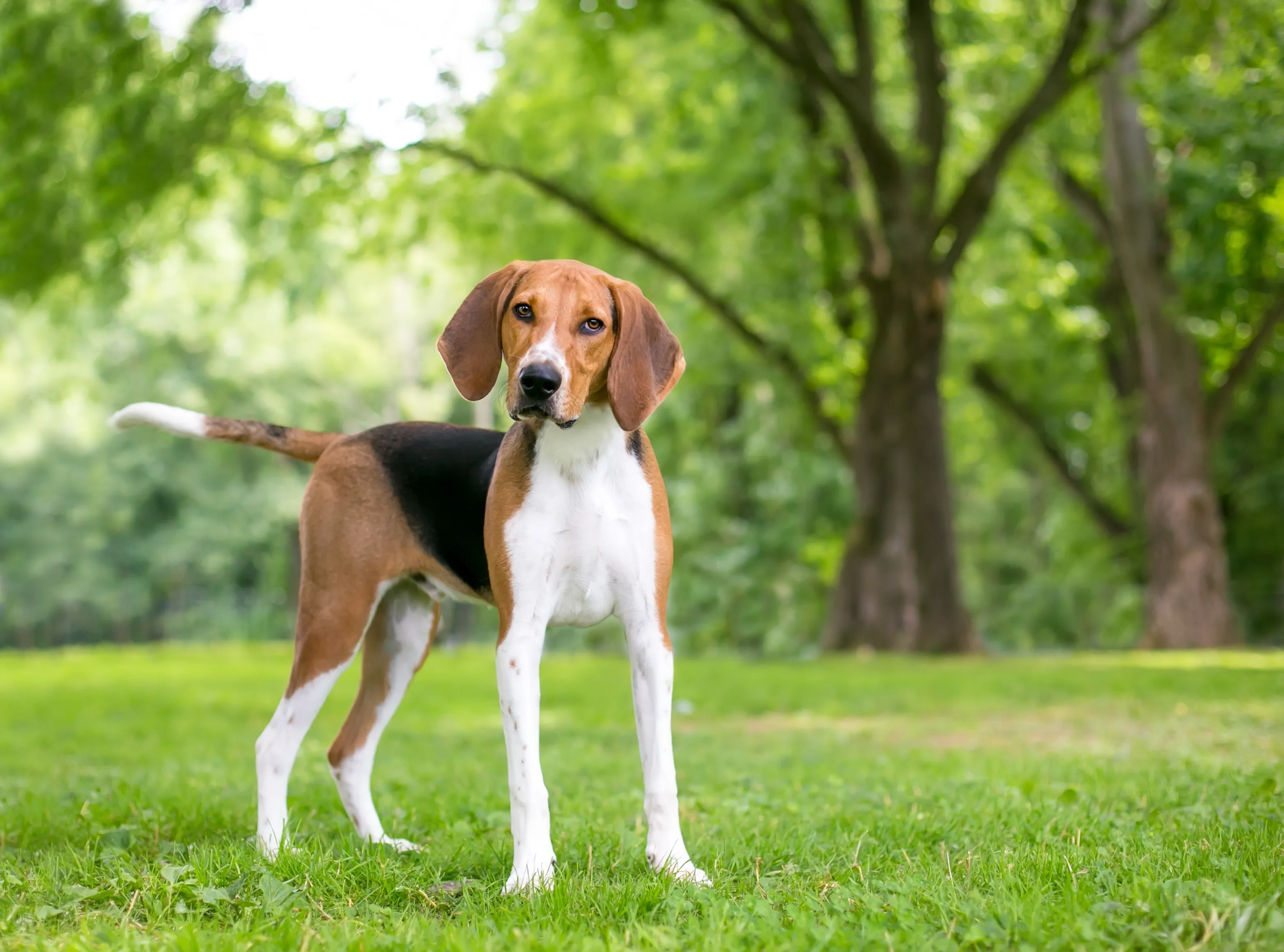 An American Foxhound stands elegantly on a lush green lawn, with a blurred backdrop of dense woods, showcasing its distinctive appearance.
An American Foxhound stands elegantly on a lush green lawn, with a blurred backdrop of dense woods, showcasing its distinctive appearance.
For those steeped in the tradition of classic foxhunts, the American Foxhound stands out among breeds of hunting dogs with pictures as the quintessential partner. Derived from French, English, and Irish foxhounds, the American variety resembles a larger, longer-legged Beagle. These substantial dogs, with males weighing 65 to 75 pounds, are known for their sweet temperament and are generally considered ineffective as watchdogs.
American Foxhounds are relentless scent hunters. In a traditional hunt, the Master of Hounds would release a pack of 30 to 40 hounds in an area known for foxes. Once they caught a scent, the chase was on. These dogs would run for hours, pausing only if the scent was lost. Foxes would employ evasive tactics, often succeeding in shaking off their pursuers. However, a panicked fox breaking into the open would often meet its end quickly at the paws of the determined pack.
One of the most memorable characteristics of this hunting dog breed is its distinctive, bell-like howl, a sound quite different from the “less refined rural yodeling of blueticks and redbones.” Their courage is legendary. As David E. Petzal recalls from his foxhunting experiences, “The Master of Hounds would have to catch dogs with bloody paws and take them out of the hunt. They would not quit—a quality that the British call ‘bottom.'” Foxhunting, a sport few will ever witness or fully comprehend, is immensely exciting, and the American Foxhound is an integral part of this thrilling, ancient pursuit.
5. Treeing Walker
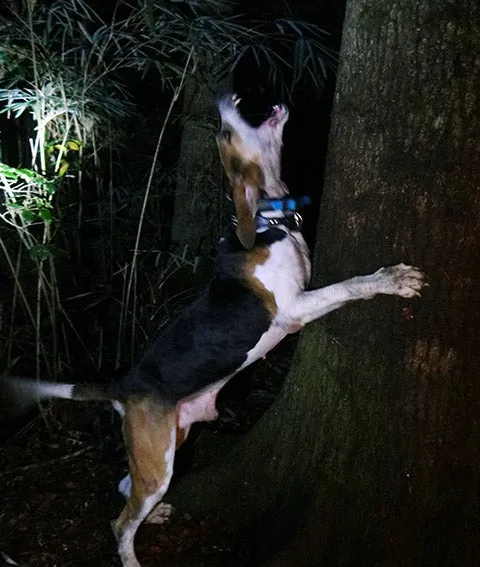 A Treeing Walker Coonhound, silhouetted against a dark night sky, barks intensely up a tree where a raccoon is likely hidden.
A Treeing Walker Coonhound, silhouetted against a dark night sky, barks intensely up a tree where a raccoon is likely hidden.
When exploring breeds of hunting dogs with pictures specialized for treeing game, the Treeing Walker Coonhound frequently earns high praise for its speed, competitive spirit, and grit. Tony Ray, owner of Roanoke River Kennels, has been around Treeing Walkers for over 40 years. He appreciates their quick start and slightly more competitive nature compared to other hounds. “They’re a bit trashier, too,” Ray notes, explaining that they have more “go” and might chase non-target animals like deer or fox when young. However, he sees this as a positive trait, indicating a dog with true grit.
Ray prefers to train his pups on live, released raccoons, rather than caged ones. This natural approach prevents the dog from becoming overly aggressive at the tree, which can lead to undesirable behaviors like jumping, flipping, or even dogfights during night hunts. It results in a “settled-down dog at the tree.”
Night hunts with Treeing Walkers are described as truly exciting. After fitting tracking collars, the dogs are released to strike a trail. Hunters then wait for the distinctive “locating bark” that signals a treed raccoon. Prior to this, their barks are typically lower, indicating they are still on the trail with their heads down. Once the raccoon is treed, their heads lift, and their bark changes, a clear message to the hunter: “Come on, Daddy, I got this thing!” These dogs are indeed highly regarded for their dedication and performance.
6. Beagle
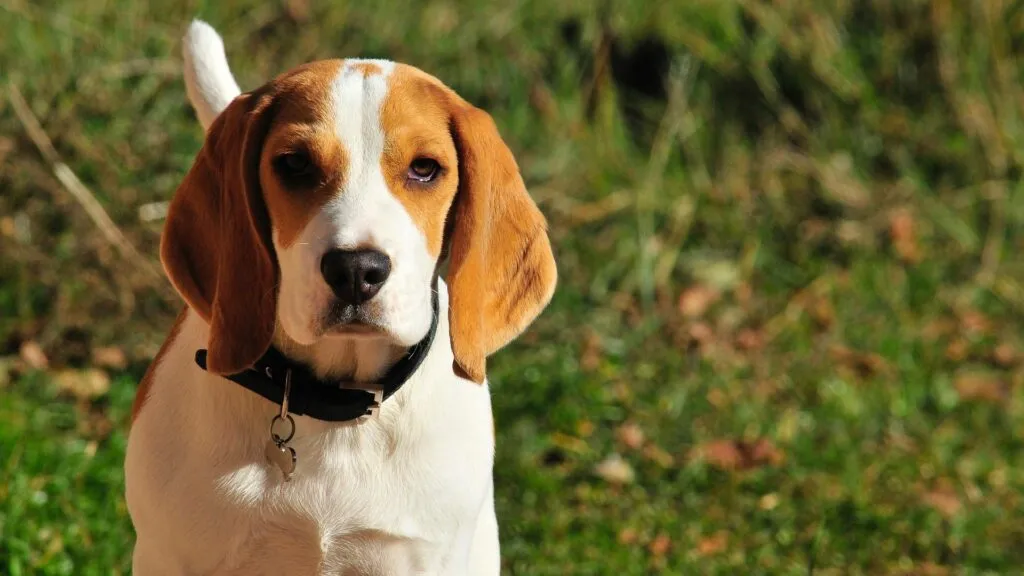 A happy Beagle runs through a grassy field, showcasing its energetic and cheerful disposition during a small game hunt.
A happy Beagle runs through a grassy field, showcasing its energetic and cheerful disposition during a small game hunt.
For hunters of small game, particularly rabbits, the Beagle is an iconic figure among breeds of hunting dogs with pictures. A traditional beagle pack can range from half a dozen to thirty members, swarming through thickets and brambles with cavalry-like coordination when hot on a rabbit track. However, even a pair of Beagles, or a single hound, can be incredibly effective, as the instinct to hunt is deeply ingrained in their DNA. As T. Edward Nickens notes, he has a friend whose Beagle, Bailey, spends “355 days a year on the sofa. But on those 10 days Bailey is in the woods, woe be unto the bunnies.”
The name “Beagle” may derive from the French word begueule, meaning “open throat,” a nod to their distinctive vocalizations. Early mentions in English date back to 1475. Historical accounts include King Henry VII keeping “glove beagles” due to their tiny size, and Queen Elizabeth I maintaining a line of 8-inch “pocket beagles” that rode in saddlebags to the hunt. Modern lines were established in the 1830s, and America embraced the breed wholeheartedly around the turn of the 20th century.
Their popularity is certainly due to their keen noses and legendary endurance on the trail, but Beagles are also arguably the “smilingest” hunting dog breeds, known for their cheerful disposition. They are content in the truck, in a child’s room, or on the sofa. Yet, they are arguably happiest when unleashed into the woods, driven by an unyielding desire to pursue a hare. Just ask any Beagle owner, they’ll attest to this unwavering passion.
7. German Wirehaired Pointer
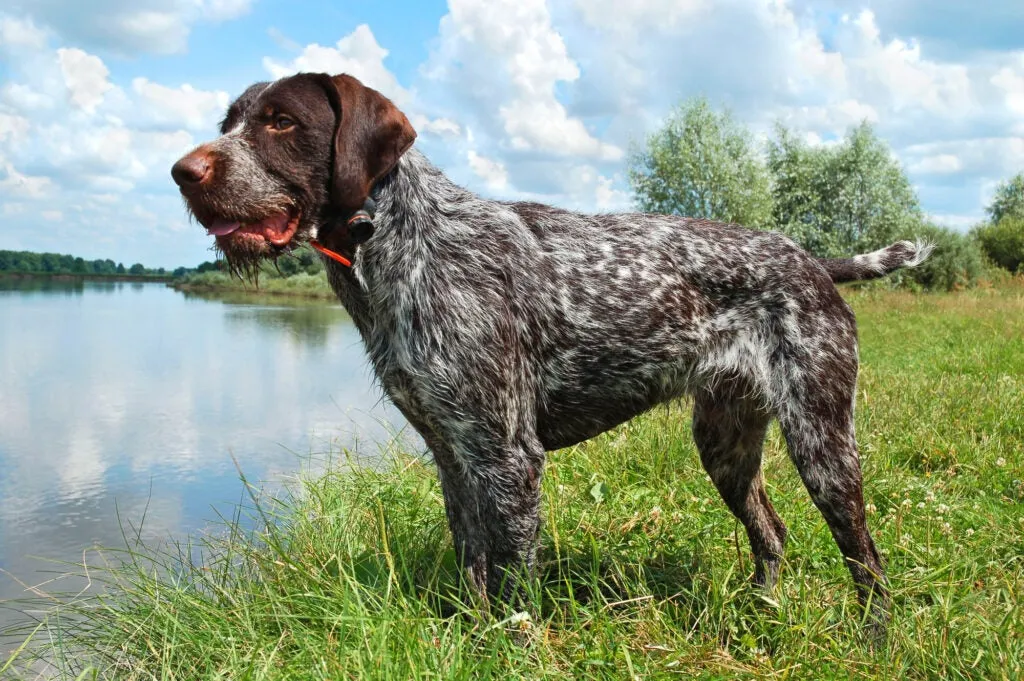 A German Wirehaired Pointer, with its distinctive wiry coat, pauses attentively in a field during a bird hunt, exemplifying its versatility.
A German Wirehaired Pointer, with its distinctive wiry coat, pauses attentively in a field during a bird hunt, exemplifying its versatility.
The German Wirehaired Pointer, though perhaps more “stolid” than “stylish,” is an indispensable partner when a wing-tipped pheasant ducks into a cattail marsh, making it a prominent entry among breeds of hunting dogs with pictures. Their ability to track cripples through complex cover and dense bird scent is legendary. Phil Bourjaily recounts seeing wirehairs return with birds held firmly in their bearded mouths after navigating conditions that leave a hunter shaking their head in awe.
Originating in the 1880s, German hunters meticulously blended Griffons, Foxhounds, Poodles, and Shorthairs. The goal was to create a versatile breed capable of pointing upland birds, retrieving waterfowl, controlling vermin, and tracking stags. This all-around capability was wrapped in a bristly coat that provides insulation without attracting burrs, making them ideal all-weather hunting dogs.
Two distinct lines exist today: the Deutsch Drahthaar and the Americanized German Wirehaired Pointer (GWP). Drahthaars are rigorously bred and tested for the original versatility, often exhibiting a more intense personality that might not be ideal around children, and a strong prey drive towards small mammals, including cats. GWPs, while less aggressive, still hunt with their heads up for air scent and are excellent retrievers. Both lines are tough, protective of their owners, and reliable companions for serious hunters. A wirehair is a dog you’d want by your side in any challenging situation, demonstrating their unwavering loyalty and formidable strength.
8. Mountain Cur
The Mountain Cur, though sometimes underestimated by the “unlearned,” holds a distinguished place in American frontier history and among breeds of hunting dogs with pictures known for their versatility. Early pioneers, venturing into the Southern Appalachians and Ohio River Valley, brought with them essential tools: flintlocks, iron pans, axes, seed corn, and cur dogs. For these settlers, a dog capable of herding livestock, facing a bayed bear, and treeing a squirrel was as vital as any implement. Small curs, originating from British herding dogs and possibly even Corgis, were true multi-purpose animals. Their utilitarian nature and favored status among common folk may have led to a lack of formal recognition for many early American cur lines. Nonetheless, they stand as icons alongside the Kentucky rifle and log cabin in the story of a nation’s settlement.
Despite this informal perception, those “in the know” understand the breed’s true value. A modern revival in cur breeding has led to the recognition of distinct lines, including Black-Mouthed Curs, Catahoula Curs, and Tennessee Treeing Brindles. The original Mountain Cur line, in particular, maintains close ties to its pioneer-era ancestral bloodline. These bear hunting dogs faced near extinction in the early 20th century as rural hunting traditions shifted with the rise of small-town life and the post-war workweek. However, in 1957, four mountain music players from Georgia, Kentucky, Virginia, and Tennessee, sharing a deep affection for the old Mountain Curs, initiated a breeding effort that successfully saved the original Mountain Cur from vanishing. This dedicated work has since inspired new generations of hunters to return to the hardwoods, ensuring countless squirrels for the stew pot and preserving a valuable piece of canine heritage.
9. Boykin Spaniel
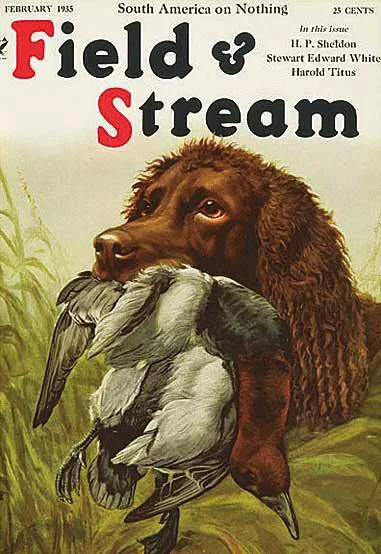 A vintage Field & Stream magazine cover from February 1935 features a Boykin Spaniel, highlighting its historical prominence.
A vintage Field & Stream magazine cover from February 1935 features a Boykin Spaniel, highlighting its historical prominence.
The Boykin Spaniel, South Carolina’s state dog, might not be the first breed that comes to mind when you think of breeds of hunting dogs with pictures, but it’s a surprising powerhouse. One hunter, initially set on a Labrador Retriever, was swayed by his wife, Jenny, to consider a Boykin. Moving from New York City to the Lowcountry of South Carolina, their priority was a dog. Jenny’s research promised a breed that could “do everything a Lab could at half the size.” Though skeptical, the idea of a “pocket retriever” intrigued him, especially for sharing a small center-console fishing boat.
The Boykin Spaniel’s origins trace back to South Carolina in the early 1900s, where they were initially employed by turkey hunters navigating swamps in small, homemade boats. Their natural talent for flushing and retrieving quickly became apparent, leading to their adoption in duck blinds and later, quail fields. Today, they also excel as dove field companions. However, their smaller size and lack of a warm undercoat make them less suitable for cold, open-water duck hunts compared to larger, hardier breeds.
Pritchard, their waterfowl hunting dog, quickly demonstrated a natural affinity for retrieving and a love for water. Like most Boykins, she possessed a strong prey drive and a clever, sometimes headstrong, personality, while remaining admirably behaved at home. Intensive training in her first year led to remarkable results; at just 8 months old, she calmly observed a dove hunt until birds began to fall. Her first retrieve remains a vivid memory. From there, she excelled in hunting wood ducks, woodcock, marsh hens, and quail, even holding her own against larger competitors in a local Dock Dog contest. Ultimately, the hunter conceded his wife was right—the Boykin was indeed the perfect dog for him.
10. Golden Retriever
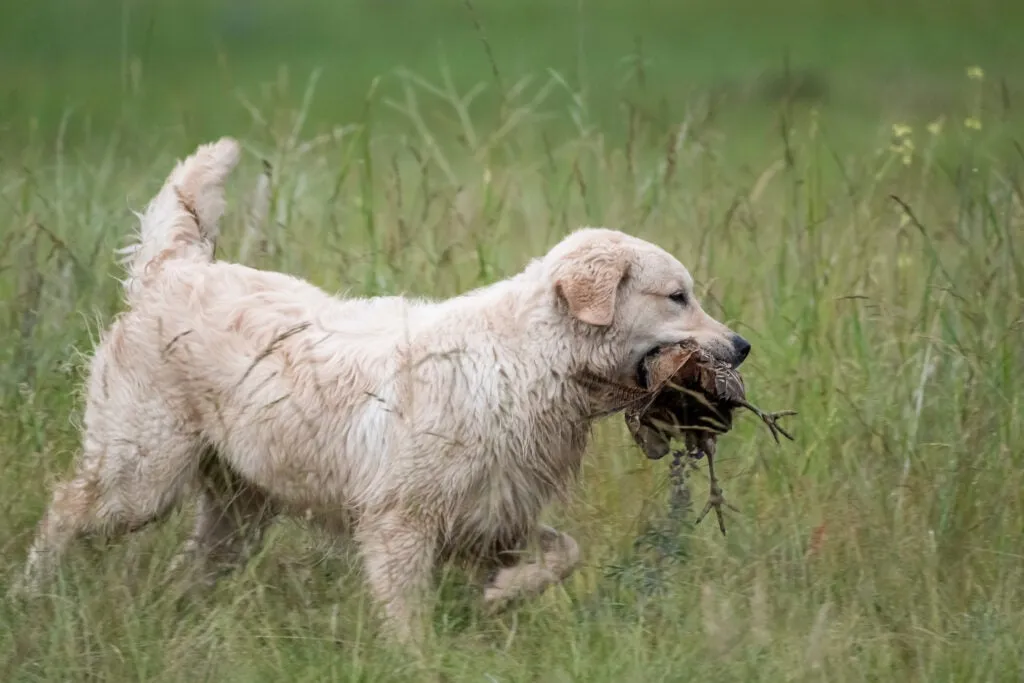 A majestic Golden Retriever, one of the best hunting dog breeds, gracefully retrieves a bird from the field during a hunt.
A majestic Golden Retriever, one of the best hunting dog breeds, gracefully retrieves a bird from the field during a hunt.
Among the elegant breeds of hunting dogs with pictures, the Golden Retriever often faces an image challenge in the hunting world. Its photogenic and glamorous appearance can lead the average sportsman to question its capabilities as a serious gun dog, one capable of excelling in both marshes and uplands. While easily imagined strolling through Beverly Hills or frolicking on a Hamptons beach, its image as a rooster-rousting, duck-retrieving powerhouse isn’t always immediate.
However, beneath that “Ralph Lauren exterior” beats the heart of a rugged, athletic, and versatile hunter. The breed’s affectionate, eager-to-please personality also tends to mask an inherent toughness. A good Golden Retriever possesses an unwavering drive; the only “soft” thing about them is their coat.
Tom Davis recounts an incident that perfectly exemplifies a Golden’s tenacity. Hunting grouse in northern Wisconsin, he nicked a bird that re-flushed before his friend’s Golden, Sidney, could grab it. After giving up hope, “Long after we’d given up hope, she dove into a blowdown and emerged with the grouse. That, my friends, is known as snatching victory from the jaws of defeat.”
While precise data is scarce, Goldens are increasingly used for upland game, particularly pheasants, more than waterfowl. Their “birdy” nature, intelligence, trainability, and exceptional nose make them superb choices for roosters, especially in heavy late-season cover like cattails and switchgrass. They should not be underestimated as duck dogs either. With their keen marking abilities and powerful swimming, they are more than capable for most waterfowlers, provided one is willing to tolerate a bit more water in the blind.
11. Irish Setter
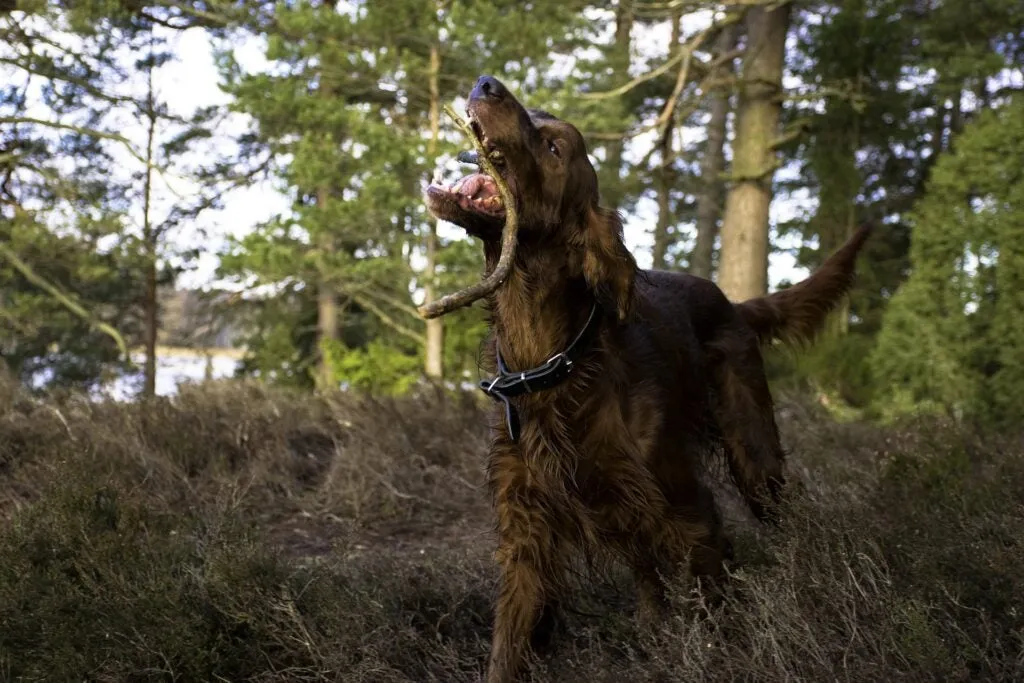 A striking Irish Setter, with its rich mahogany coat, actively fetches a stick in a vibrant green field.
A striking Irish Setter, with its rich mahogany coat, actively fetches a stick in a vibrant green field.
With its stunning burnished mahogany coat, a distillation of autumn’s essence, the Irish Setter might be the most beautiful among the breeds of hunting dogs with pictures. However, beauty often comes with a price. For much of the 20th century, breeders focused so heavily on the Irish Setter’s conformation that finding a “red dog” with true hunting capabilities became exceedingly rare. The breed also gained a reputation for being somewhat “rattle-brained,” a label not entirely undeserved at the time.
Thankfully, those days are largely in the past. While distinct show and field lines still exist, the overall quality of today’s hunting Irish Setters is higher than ever. It’s somewhat puzzling that these magnificent red dogs aren’t more popular. They are athletic, stylish, biddable, and deceptively tough, yielding to none as exceptional bird-finders and rugged all-purpose hunters. Their partisans will passionately argue that an Irish Setter is every bit the gun dog an English Setter is, a claim well-supported by bulging gamebags, satisfied smiles, and unwavering allegiance.
For those curious about the terms “red setter” and “Irish setter” used almost interchangeably, it’s a keen observation. The distinction primarily lies in registration: “red setter” is favored by those who register their dogs with the Field Dog Stud Book, while “Irish setter” is preferred by those using the American Kennel Club. The essential takeaway, however, remains simple: they both hunt, and they hunt with remarkable skill and passion.
12. Bluetick Hound
Among the deeply “houndy” breeds of hunting dogs with pictures, the Bluetick Hound stands out with its distinctive appearance and unwavering nose. These dogs are big-eared, block-headed, and mottled with striking spots and splotches, ideally featuring tan spots over their eyes. Their lineage traces back to the bleu de Gascogne hounds of France and the venerable English Foxhound.
Blueticks, particularly among bear hunting dog breeds, possess a non-stop nose and will enthusiastically tree almost any creature in the woods. Hunters should be prepared for them to wander for an hour or two in pursuit of a scent. They are also bred as “free-tonguers,” meaning it’s perfectly normal—even expected—for them to “open up and bugle” occasionally while on the trail, not just when on a hot track. This vocal trait adds to their charm, even if it means they might howl at every new human they meet.
However, their generally “chill” personalities should not be mistaken for laziness. Blueticks are high-energy dogs that require ample opportunity to burn off steam, making them unsuitable for potential owners with “couch-potato tendencies.” But for those seeking a dog made of “equal parts nose and heart,” a Bluetick can indeed become a loyal friend for life, bringing unparalleled dedication to the hunt.
13. English Pointer
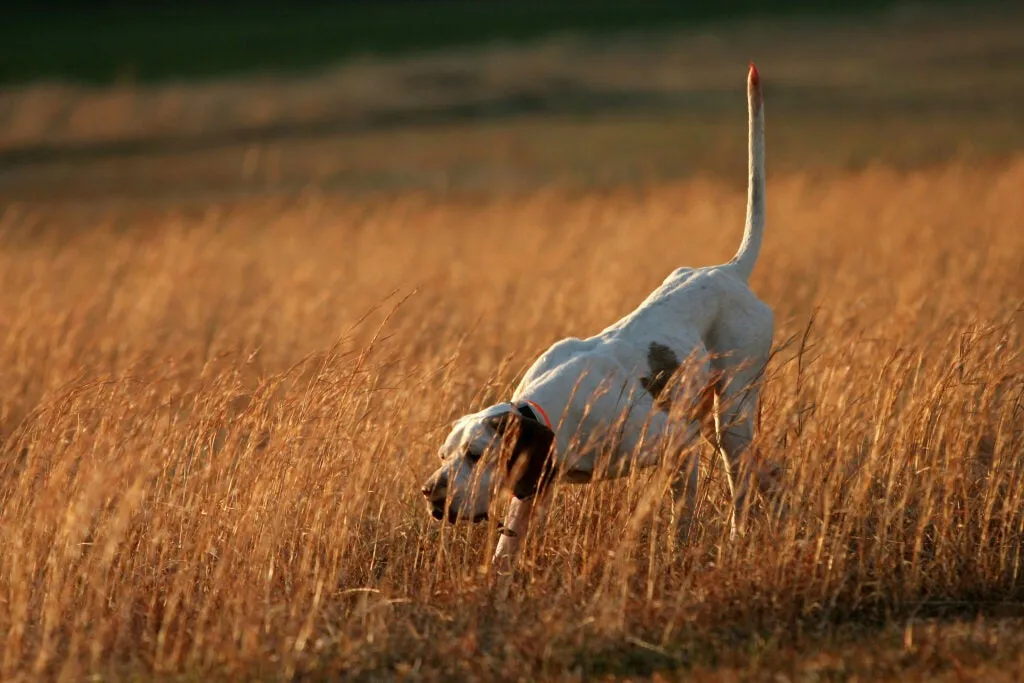 A sleek pointer stands intensely focused in a field, holding a classic hunting stance during an upland bird hunt.
A sleek pointer stands intensely focused in a field, holding a classic hunting stance during an upland bird hunt.
There are two distinct types of bird hunters, according to one perspective: those who believe English Pointers are the only breeds of hunting dogs with pictures worth feeding, and those who are utterly intimidated by them. Their intensity can be formidable. As Guy de la Valdène eloquently states in For a Handful of Feathers, “When a good English pointer faces a bird… he does so with all but one foot on the coals of hell.”
Technically, the breed’s official name is simply “Pointer.” Saying “English pointer” below the Mason-Dixon Line might earn you a strange look. Regardless of nomenclature, the Pointer embodies high performance. Hunting with other breeds might feel like driving a family sedan, but hunting with a Pointer is akin to taking the wheel of a Ferrari – revealing gears you never knew existed. However, this power demands control; an inexperienced trainer can quickly find a Pointer getting “away from them,” earning the description of “too much dog.”
Yet, when paired with a skilled handler, the result is pure magic, particularly in expansive landscapes. A Pointer doesn’t merely cover ground; it “scorches it.” And when the dog strikes point, transforming from raw kinetic energy into quivering canine statuary, it’s a sight that inspires awe.
The primary vulnerability in the Pointer’s formidable arsenal is its limited ability to withstand extreme cold. Tom Davis notes witnessing two instances of hypothermia in dogs, both Pointers hunting late-season pheasants in single-digit temperatures. Beyond this, finding fault with the breed is challenging. Dispel any notions of aloofness; given the opportunity, a Pointer can be the most affectionate house dog imaginable, a closeness that paradoxically enhances its field performance. It also serves as a crucial reminder to the Pointer that hunting birds is a partnership, not a solitary endeavor.
14. English Springer Spaniel
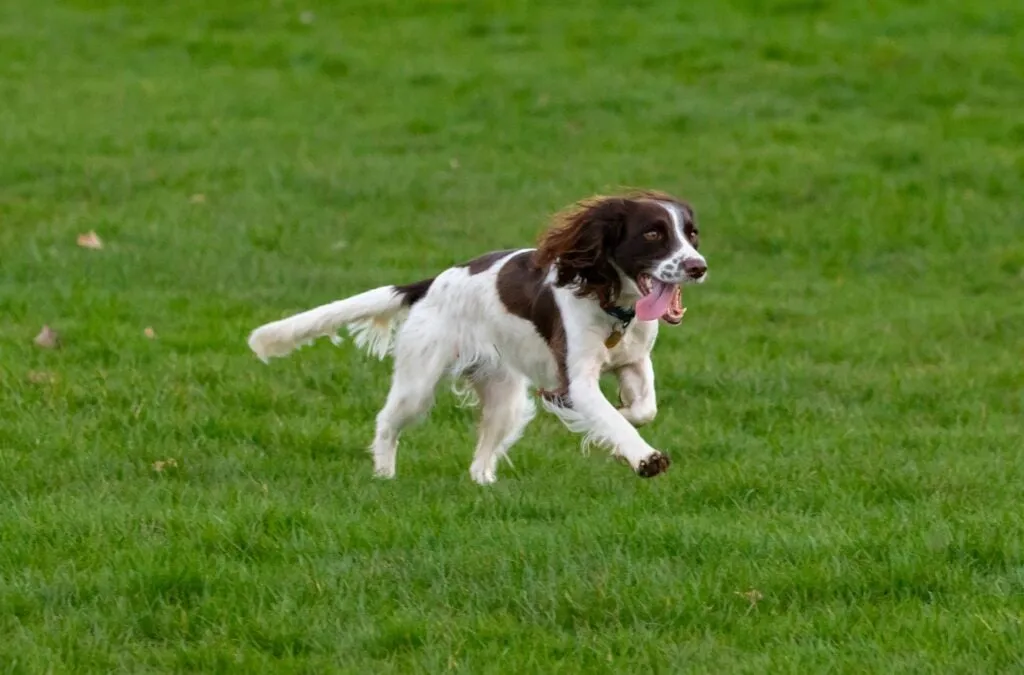 An English Springer Spaniel, one of the best hunting dog breeds, actively trains in a field.
An English Springer Spaniel, one of the best hunting dog breeds, actively trains in a field.
Among the dynamic breeds of hunting dogs with pictures, the English Springer Spaniel is a true “pocket rocket,” a “stick of canine dynamite.” As Kyle Wintersteen describes, the moment his Springer, Freedom, catches a whiff of a rooster, “he explodes.” His eyes widen, conveying an almost predatory focus as he blasts into dense brambles and Rosa multiflora. Freedom’s pursuit is anything but methodical; he rapidly deciphers the running rooster’s path, closing in with lightning speed. Shrubs shake, briers fly, and it feels as though he’d tear through drywall if pheasants were on the other side. The climax is dramatic: the 50-pound liver-and-white Springer leaps from the brush as the cackling rooster takes flight. While this breed’s propensity for airborne flushes may not necessarily put more birds in the bag, it’s akin to a slam dunk—thrilling nonetheless.
Wintersteen also hunts ducks with his Springers, right up until freezing conditions threaten their single coats. The retrieving abilities of this hunting dog breed often impress even Labrador aficionados, and he asserts he’s never witnessed a breed display a superior nose for recovering crippled birds. However, it’s crucial to consider the seven to nine months of the year when hunting isn’t happening. Averaging 35 to 40 pounds and lacking the oily odor common to many breeds, Springers make delightful house dogs.
They are inherently happy dogs, often appearing to “smile” with genuine inclination. There’s profound simplicity in the pleasure of a Springer following you around the home all day or guarding the foot of the bed at night. For many, life without a Springer is almost unimaginable, a testament to their deep companionship and unwavering loyalty.
15. Chesapeake Bay Retriever
When delving into breeds of hunting dogs with pictures, particularly retrievers, the Chesapeake Bay Retriever (Chessie) stands apart with its extreme loyalty and unwavering devotion to its owner. While Labs and Goldens tend to embrace everyone, a Chessie singles out its person. As Dyane Baldwin, owner of Pond Hollow Chesapeakes, explains, “The Chesapeake will follow you everywhere, because he’s your friend, your sidekick, your partner. He is your dog, period.” This intense loyalty also makes Chessies excellent watchdogs compared to other retriever breeds.
Naturally, they are exceptional hunting dogs. Athletic and outdoors-loving, they possess an absolute passion for water. Their determination is legendary; in freezing water or challenging conditions, they will persevere through difficult situations to retrieve that duck or goose. While capable in the uplands for small game, Chessies truly shine as the premier waterfowl dog. For those who hunt in harsh, cold environments, this is the dog of choice. They boast superior noses and are particularly adept at locating crippled birds.
However, this fierce determination, while admirable in the field, can be a double-edged sword, making obedience training absolutely essential. A Chessie needs to understand that “no” means “no.” Baldwin likens owning a Chessie to having a 3-year-old, as they often test boundaries. Consistency and innovation in training are key because they learn quickly and can become bored easily. Once they mature around 3 or 4 years old, they settle into the established relationship and understand boundaries.
Crucially, a Chessie is not a dog to be kept solely for weekend hunts. To truly experience the best of this breed—its devoted and loyal companionship—it must be an integral part of your life, accompanying you in the car, on the boat, and sharing your daily routines. Make a Chessie your buddy, and you will unlock its very best qualities.
16. American Pit Bull
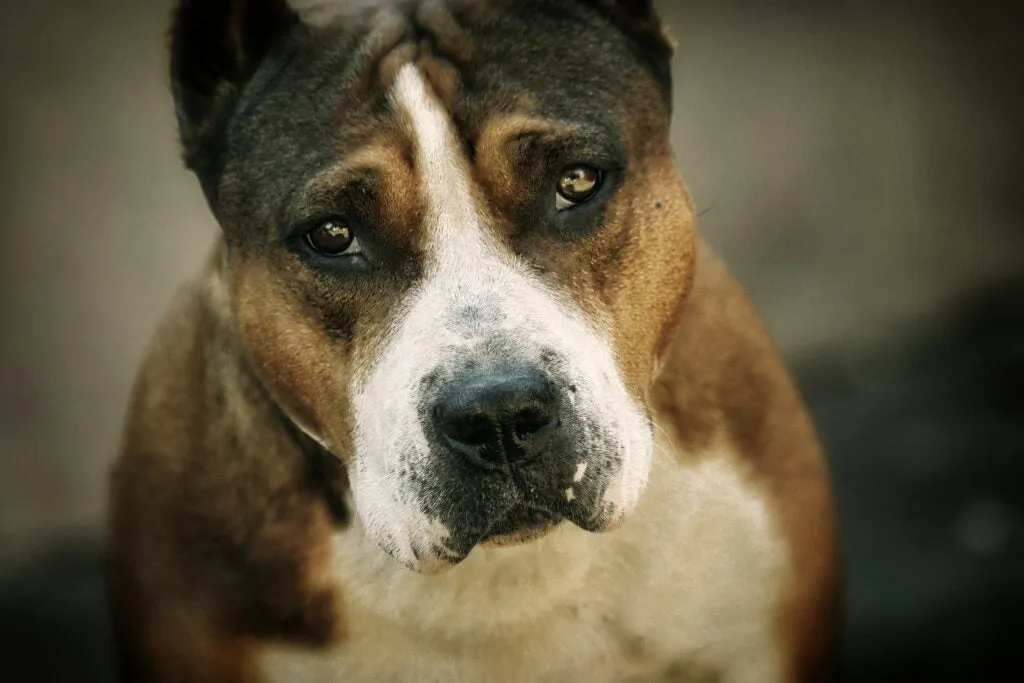 An American Pit Bull, renowned for its fierce hunting capabilities, displays a gentle and sweet expression.
An American Pit Bull, renowned for its fierce hunting capabilities, displays a gentle and sweet expression.
Among the more unconventional breeds of hunting dogs with pictures, the American Pit Bull commands respect for its undeniable ferocity in the field, coupled with a surprising sweetness in temperament. One vivid account describes Major, a Pit Bull adorned with a Kevlar vest and heavy metal collar, his face scarred from encounters with boar tusks and pig hooves. His role was to “manhandle the pig to the ground” after smaller “jump dogs,” typically Catahoula hounds, had driven the wild hog into a corner of south Louisiana’s swamp. Major had an undefeated record.
Despite his rough exterior and formidable hunting prowess, his young Cajun owner affectionately described him as “a sweetheart,” adding, “I’d lay my baby down with that dog and not think twice about it.” This anecdote perfectly encapsulates the paradox of the American Pit Bull—a breed both adored and maligned, frequently misunderstood and misjudged.
While their capacity to be fierce, fearsome, and even fight to the death is undisputed, it is equally true that they can be loving, gentle family companions. In contemporary times, the burgeoning wild pig populations have given the American Pit Bull a renewed purpose in the sporting world. They are truly unmatched for their ability to bring down any feral hog cornered in a dark, swampy thicket, demonstrating a powerful combination of strength and determination.
17. Cocker Spaniel
The field-bred English Cocker Spaniel, often dubbed a “pocket rocket” or “little big dog,” is a whirlwind of canine dynamite among the breeds of hunting dogs with pictures. If you’ve hunted over one, you’re likely nodding and smiling in agreement. This cover-shredding, perpetual-motion machine, with ears flying, legs churning, and a stubby tail blurring, tirelessly quests for game. There’s no superior flushing dog for grouse and woodcock—it is, after all, the “cocker.” And until you’ve hunted snipe with one, your education as a hunter remains incomplete; the sheer fun of it might make you wonder if it’s even legal.
Pheasants and light-duty waterfowling also fall within the Cocker’s expertise, and the breed is devastatingly effective on Huns and sharptails when these birds hunker down in heavier cover. Tom Ness’s Cocker, Oscar, once sent into a North Dakota plum thicket, caused the thicket to “explode as Huns blew out in every direction.”
While Cocker hunting isn’t new to American shores—Frank Forester lauded the breed in the 1850s—they faded from the scene by the 1960s. Their renaissance began in the ’80s, and over the last two decades, they’ve proven themselves not only as highly functional game-getters but also as some of the most exciting dogs to swing a shotgun over.
The excellent news for sportsmen is that Cocker breeders have consistently focused on producing dogs with abundant natural ability, meaning extensive equipment or expert knowledge isn’t required for training. Given a solid obedience foundation and proper introduction to the gun, a typical Cocker quickly embraces hunting. However, these dogs do possess a mischievous streak, so partnering with a Cocker often benefits from a good sense of humor.
18. German Shorthaired Pointer
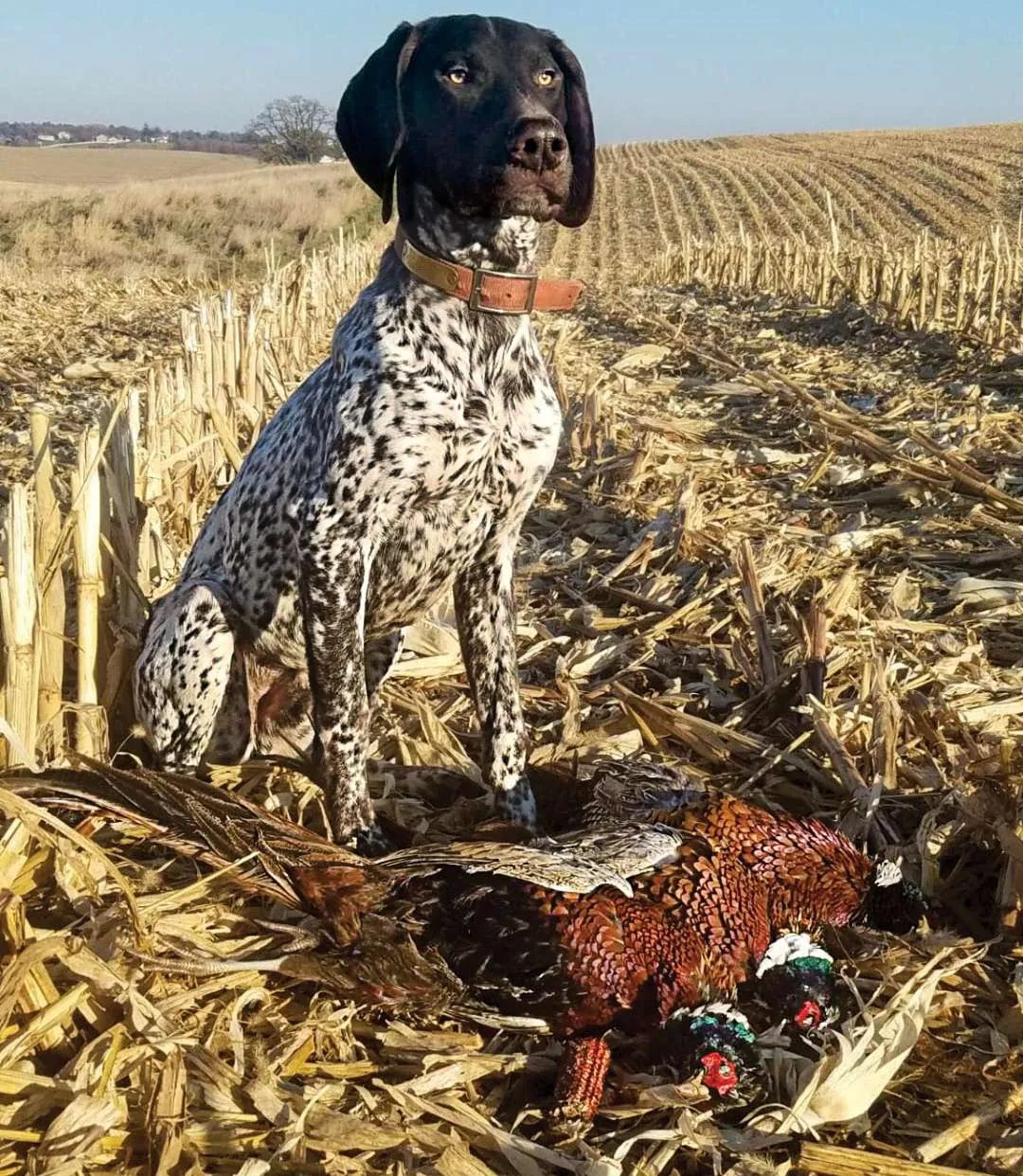 A German Shorthaired Pointer named Zeke proudly sits after a successful pheasant hunt, showcasing his strong bond with owner Phil Bourjaily.
A German Shorthaired Pointer named Zeke proudly sits after a successful pheasant hunt, showcasing his strong bond with owner Phil Bourjaily.
It’s no exaggeration to call the German Shorthaired Pointer (GSP) “America’s bird dog,” making it an essential inclusion among breeds of hunting dogs with pictures. Wherever birds are found in the United States, GSPs are reliably there to point them. Phil Bourjaily has lost count of the Iowa pheasants shot over his own and others’ Shorthairs. He’s also followed them after ruffed grouse in Minnesota forests, chukars on Idaho ridges, and blue grouse in Utah mountains. On a bobwhite hunt in Texas, they quartered to the beeps of a truck’s horn, demonstrating their incredible versatility. Beyond birds, GSPs are highly adaptable. A friend uses his in a sneak boat to retrieve early-season ducks, while Bourjaily’s cousin once hunted pheasants by day and raccoons by night with his Shorthairs.
Shorthairs are biddable, versatile, easy to train, and exceptional retrievers, naturally working within range of hunters on foot. Their coats are efficient, picking up no burrs yet providing warmth on cold late-season hunts. Some interpret their dignified and intelligent expression as aloofness. While kenneled GSPs can indeed be standoffish, raising a Shorthair in the house almost guarantees a lifelong friend. This close companionship can significantly enhance their performance afield, fostering a deeper understanding and partnership between hunter and dog.
19. Redbone Hound
The deep, resonant bark of a Redbone Hound at night, signaling it has treed game and is waiting for you, is a sound that “never gets old,” according to Wayne Campbell, owner of Timber Chopper Redbones. This dog is truly “born and bred to run and tree,” and when a Redbone strikes a track, hunters can expect to find game treed within minutes. Unlike some other hound breeds where success rates with puppies can be lower, Campbell notes that “a redbone, though, is going to run and tree and do a good job.” This hunting dog breed trains with remarkable ease, quickly picking up hunting and tracking skills.
Campbell expresses immense enjoyment in hunting with Redbones, emphasizing that the pleasure now comes less from the act of killing bears or raccoons, and more from “the pursuit and watching the dogs work.” He finds great satisfaction in witnessing their continuous improvement, with a personal goal to “keep breeding a better dog,” always searching for the “perfect hound.”
Beyond their field capabilities, Redbones make wonderful companion dogs. They possess an inherent desire to please, whether it’s in the trees or in the backyard. They are content to lie on the back porch or join you inside the house, and contrary to old beliefs, this domestic comfort will not diminish their tracking ability. “People used to say you need to keep them in the kennels, but that’s not true,” Campbell asserts. Indeed, your best hunting dog can truly be your best friend, embodying loyalty and skill in equal measure.
20. Jack Russell Terrier
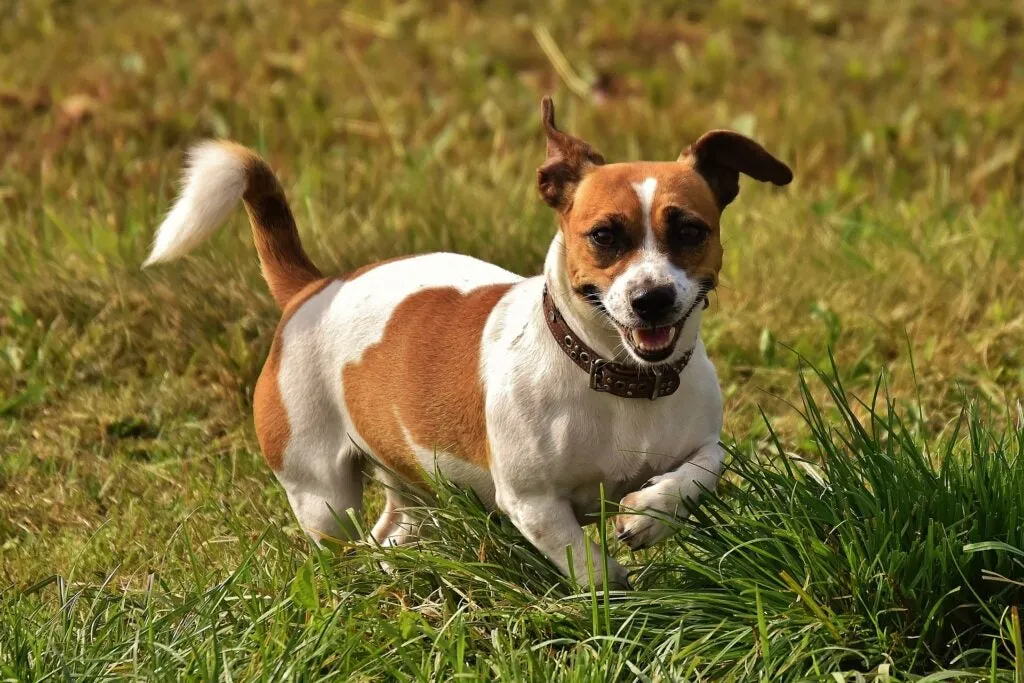 A tenacious Jack Russell Terrier energetically races across a field, demonstrating its agility and drive.
A tenacious Jack Russell Terrier energetically races across a field, demonstrating its agility and drive.
The Jack Russell Terrier (JRT), while small, possesses a giant personality and a fierce hunting drive, making it a surprising entry among breeds of hunting dogs with pictures. Mike Bilbo, owner of Rancho Fiasco, recounts being intrigued by JRTs when seeking a small, easy-to-keep working dog with a large-dog personality. A 10-week-old puppy, bold and outgoing, grabbed his pant cuff, cementing his decision: “This is the breed for me.”
Primarily bred for pest control—targeting badgers, foxes, or raccoons—JRTs are incredibly versatile. Big-game hunters utilize them for blood-trailing deer and elk. Bilbo even met a Professional Hunter (PH) from South Africa who exclusively used JRTs for trailing lions, claiming they were the only breed brave enough to face a lion yet agile and fast enough to escape. Bilbo once used JRTs for pheasant hunts, finding them excellent at flushing birds from corn rows—perhaps “too good,” as they would run too far ahead, flushing birds out of range. For the JRTs, it was simply “a tremendously fun game,” leading him to cease using them for that purpose.
Pest control work with JRTs, though far from traditional sport hunting, is an ancient and satisfying style of hunting. Bilbo finds it fulfilling to “unlock the genetic code in the dog’s brain and watch it do what it was bred to do.” He deeply appreciates their tenacity and notes their surprisingly sweet nature, demonstrating that size is no indicator of a hunting dog’s heart or skill.
21. Plott Hound
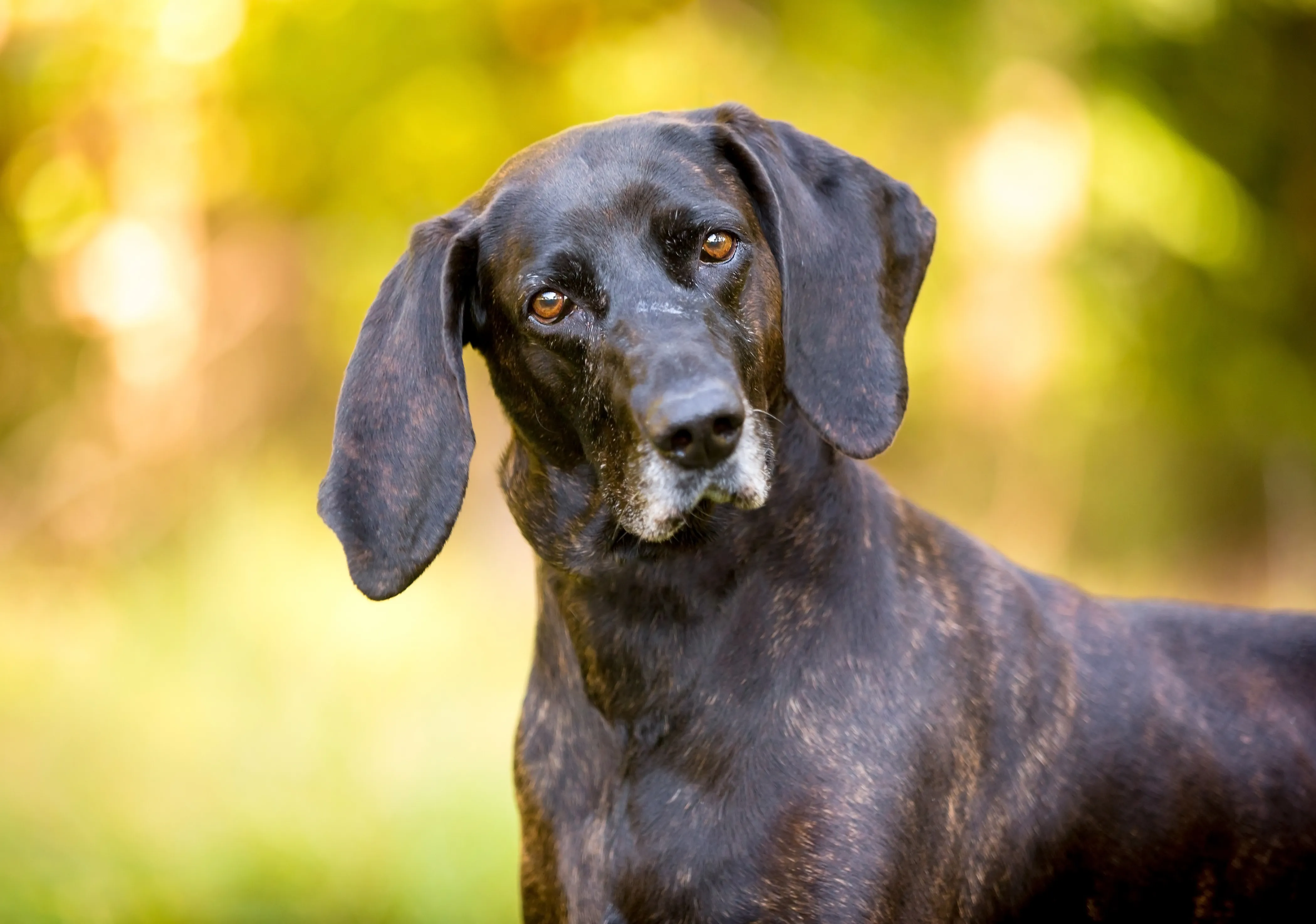 A Plott Hound with a glossy, brindled coat gazes intently at the camera, standing in dappled sunlight within a dense forest.
A Plott Hound with a glossy, brindled coat gazes intently at the camera, standing in dappled sunlight within a dense forest.
The Plott Hound stands as one of America’s great breeds of hunting dogs with pictures, celebrated for its exceptional ability to navigate complex scent trails over challenging terrain. Its lineage traces back to Johannes George Plott, who emigrated from Germany to the Smoky Mountains of North Carolina in the 1750s with a mix of German bloodhounds. The Plott family meticulously bred their dogs for decades, eventually establishing the Plott Hound’s fame for hunting bears and boars, and later for running raccoons. These athletic, medium-framed hounds come in various colors, but all are characterized by their distinctive brindled, glossy coats.
Alex Robinson recounts a challenging bear hunt in Maine where a graying old Plott named Danger proved indispensable. Two other dogs had treed a bear somewhere high on the ridge, but their baying couldn’t be heard, and GPS signals were unreliable due to mountains and heavy clouds. Danger was needed to locate them. The hunting party followed Danger and two other dogs uphill, scrambling over deadfalls and mossy granite for an hour. Danger’s ears suddenly perked up. Though the hunters heard nothing, they pressed on. Fifteen minutes later, Danger “zeroed in on the action and pulled hard against her lead—a 50-pound dog dragging a 250-pound man up a mountain.”
Finally, the faint howls of the two treed redticks became audible. The dog handler released Danger and signaled for the other two dogs to follow her. The success of the hunt hinged on Danger’s ability to lead the younger dogs to the tree and hold the bear. If she veered off on the wrong track, the entire pack could be led astray, allowing the bear to escape. The baying intensified, confirming all five dogs were at the base of the tree, their barks and howls echoing across the mountaintop. Danger had successfully completed her crucial task, a testament to the breed’s unparalleled scenting and tracking capabilities.
The Uncommon Yet Remarkable: Bonus Hunting Dog Breeds
Beyond the well-known champions, some breeds of hunting dogs with pictures might not immediately spring to mind, yet they shine brightly in the field. We’d be remiss not to highlight these exceptional, if less common, contenders.
Small Munsterlander
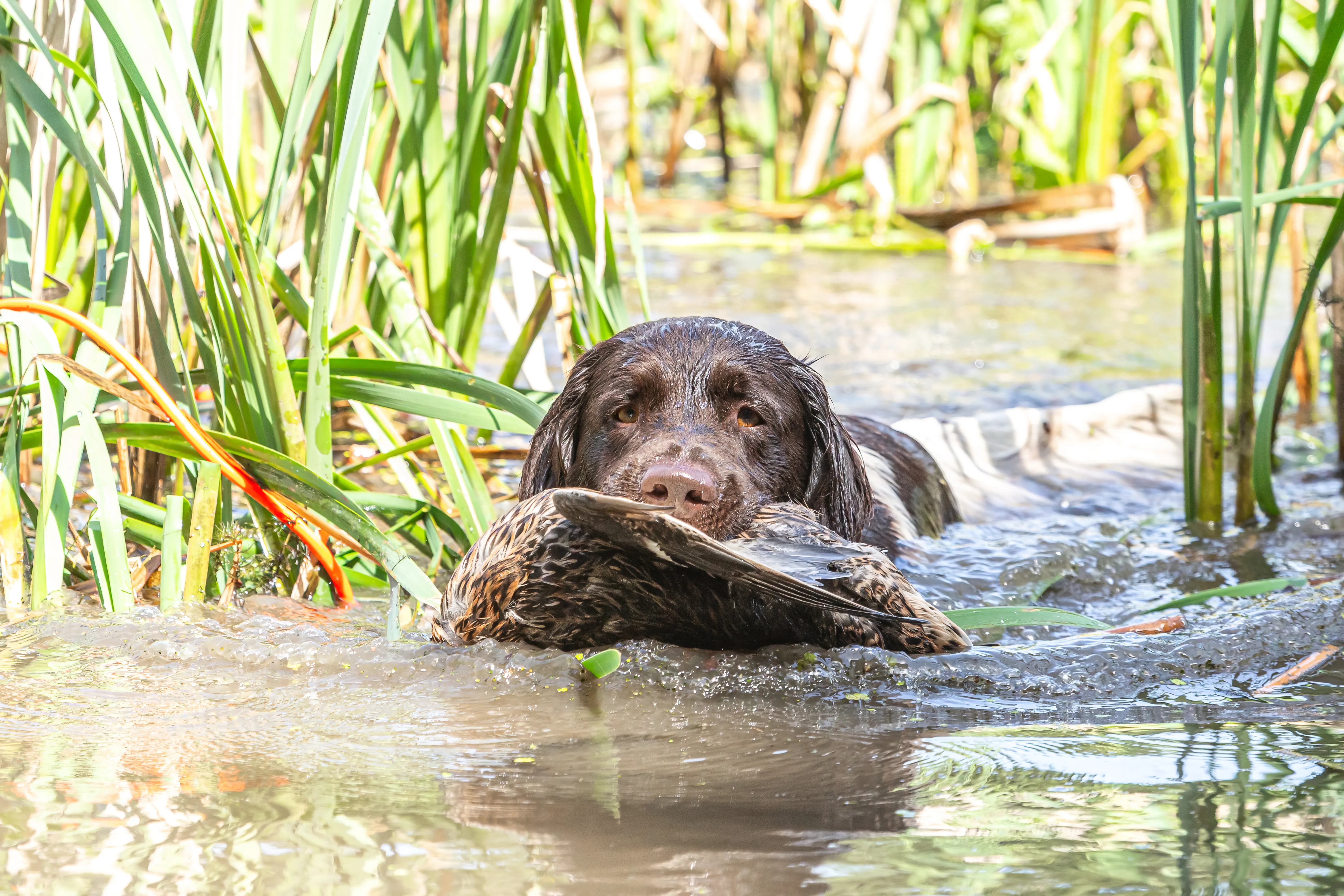 A beautiful Small Munsterlander, with its distinctive liver-and-white coat, confidently retrieves a duck from the water.
A beautiful Small Munsterlander, with its distinctive liver-and-white coat, confidently retrieves a duck from the water.
Strictly speaking, Small Munsterlanders are typically expected to retrieve birds silently, only vocalizing when tracking furred game. However, Anka, a Small Munsterlander owned by a hunter’s cousin, would charmingly “bay on the track of a crippled pheasant.” This yipping allowed hunters to follow her progress through tall grass. Inevitably, the yipping would cease as she retrieved the pheasant, as “you can’t bark much with a pheasant in your mouth.” Anka was renowned as an exceptional pheasant retriever and also brought in several ducks over the years.
In the U.S., Small Munsterlanders often remain a mystery to many. With their striking liver-and-white coats, long tails, and a weight range of 30 to 38 pounds, they are frequently mistaken for Setter-Springer crosses. However, these continental/versatile dogs, developed around 1900, offer far more. They were originally bred as all-around hunting dogs for market hunters, making essential their tracking and retrieving skills.
Small Munsterlanders are biddable, easy to train, and their compact size makes them excellent family pets. Despite a small but growing following in the U.S., it’s hard to understand why they haven’t achieved wider recognition in hunting circles. Perhaps one day, this remarkable breed will become a household name, cherished by many more hunters.
Hunting Doodles
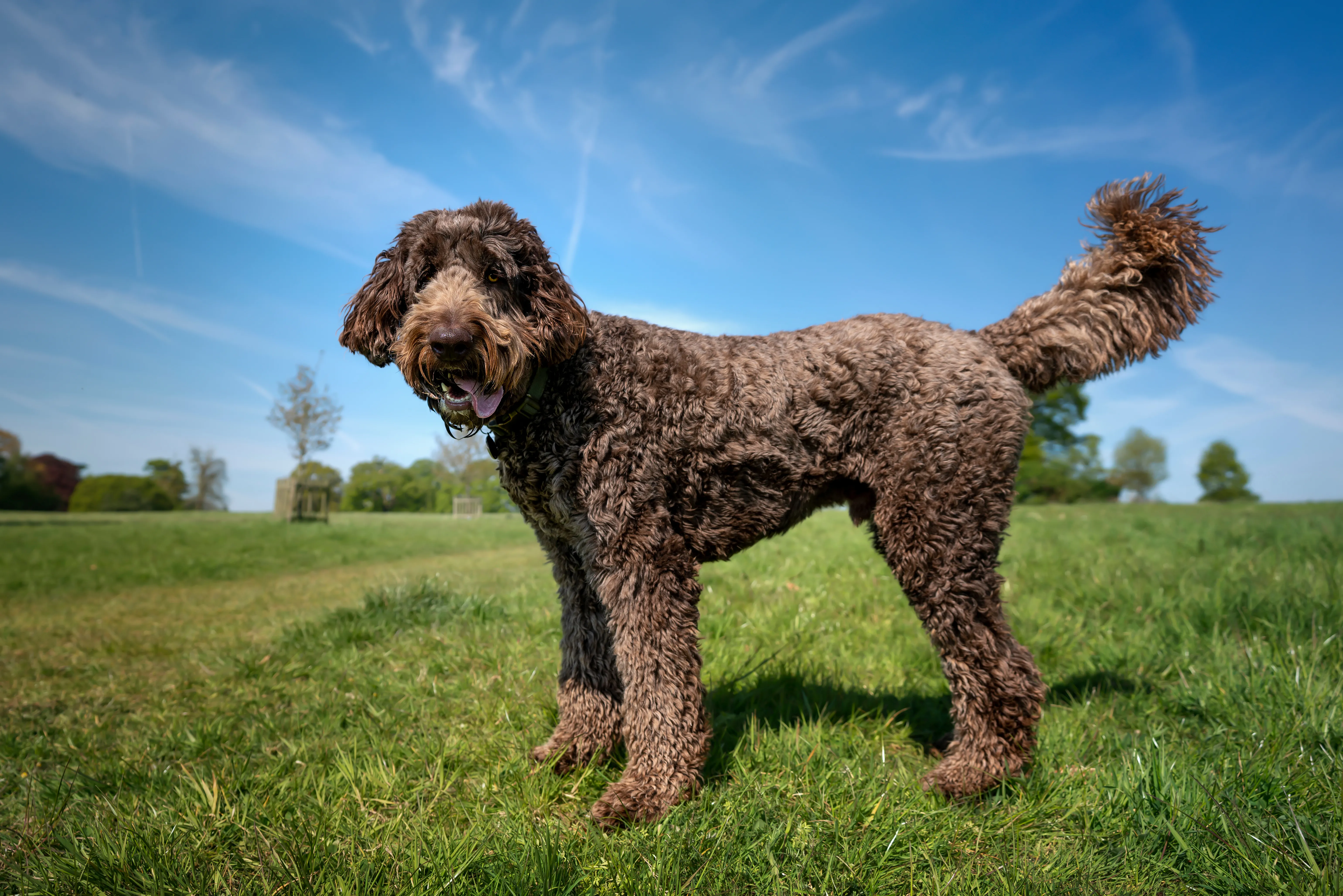 A shaggy Labradoodle stands attentively in a grassy field, showcasing its unique appearance that blends Labrador and Poodle traits.
A shaggy Labradoodle stands attentively in a grassy field, showcasing its unique appearance that blends Labrador and Poodle traits.
Labradoodles and Golden Doodles often defy the traditional image of breeds of hunting dogs with pictures, and indeed, many are not bred for the field. So, when Colter Kinner’s Golden Doodle, Wyo, joined a pack of Labs and Brittanys on a released bird hunt, it was assumed Wyo would provide comic relief. However, Wyo, looking like a “muppet,” flushed and fetched like a seasoned professional, demonstrating the surprising capabilities of dedicated hunting doodles, which come in two main types: Labradoodle and Golden Doodle.
The initial concept behind the Lab/Poodle mix wasn’t to create a new hunting dog. Before 1989, such crosses were simply “mutts.” But an Australian breeder, aiming to create a guide dog for a blind man with dog hair allergies, developed the Lab/Poodle cross. While not all Poodles have hypoallergenic fur, many do, and they generally shed minimally. This cross gained global popularity in the 1990s as a “designer dog.” Given that Labs are America’s premier retriever and “Poodle” derives from the German “pudeln” (“to splash in water”), it naturally follows that a cross between the two could result in a capable gun dog. Consequently, some breeders began developing specific hunting strains. Golden Doodles, a mix of Golden Retrievers and Poodles (sometimes with Chesapeake Bay Retriever added), follow the same principle. Both Labradoodles and Golden Doodles will hunt effectively if sourced from breeders specializing in field-bred lines.
Prospective owners must carefully research breeders specializing in hunting doodles and navigate terminology like F1 (50-50 Lab/Golden-Poodle cross), F2 (doodle-doodle parents), F1B, and F1BB to find the mix best suited to their needs. As an added bonus, some pointing doodles also exist. Perhaps one day, Labradoodles and Golden Doodles will achieve recognized breed status, and no one will bat an eye when a doodle is released from its crate for a hunt.
Dachshund
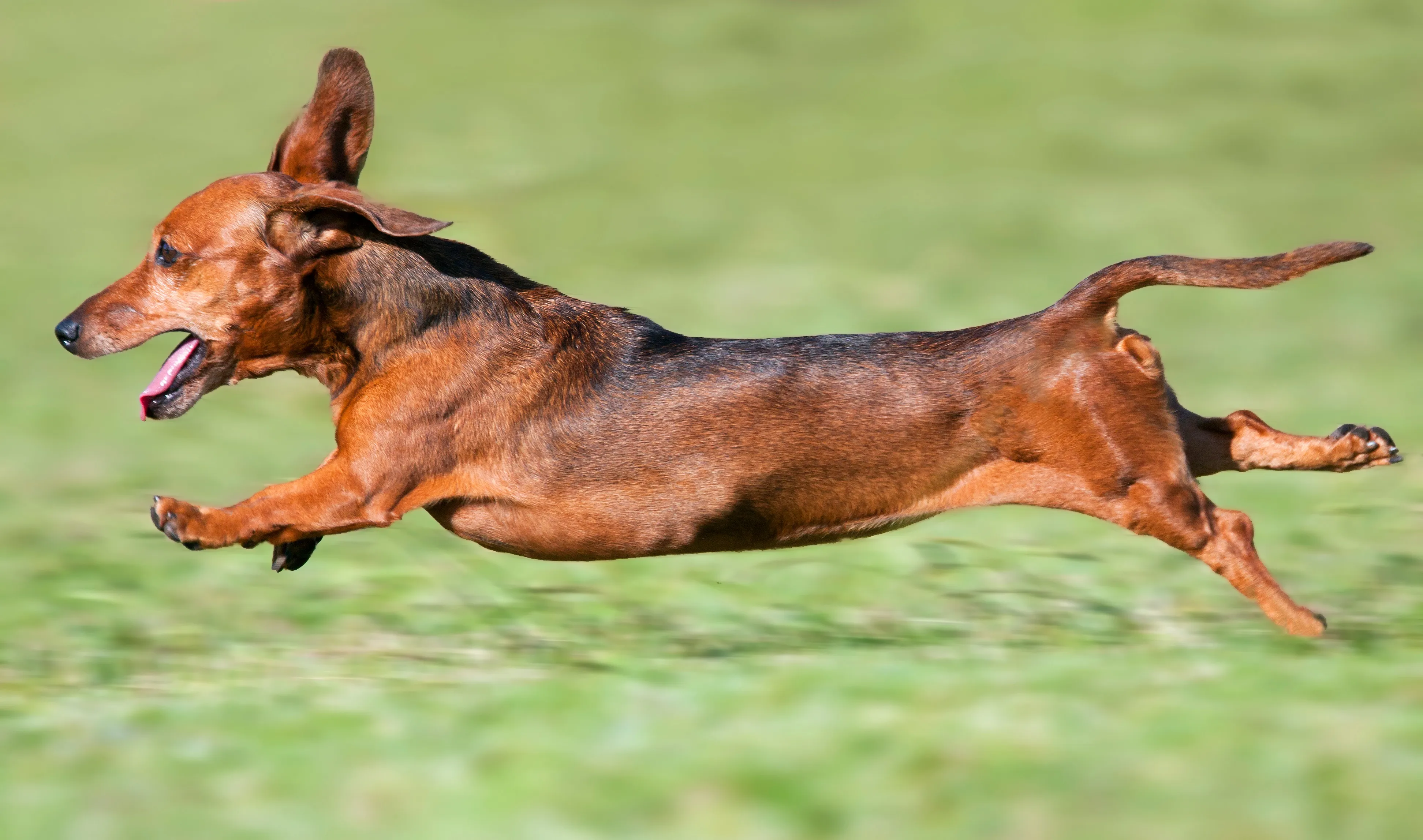 A long-bodied Dachshund with short legs races swiftly across a grassy field under a bright sky.
A long-bodied Dachshund with short legs races swiftly across a grassy field under a bright sky.
Many people fail to associate Dachshunds with hunting, or to fully appreciate their formidable capabilities. However, their very name, translating to “badger hound,” immediately places them among specialized breeds of hunting dogs with pictures. Those distinctive short legs and long, “wiener-dog” bodies are perfectly adapted for crawling into holes and engaging with badgers—a dangerous task they have excelled at since the 1500s. Dachshunds possess a fierce temperament honestly, demonstrating remarkable determination and an intense prey drive.
Beyond badgers, they excel at hunting other furred game, and some will even retrieve birds. Dachshunds also make excellent deer-tracking dogs; their smaller size (a 15-pound tracking dog is much easier to manage on a lead) is a practical advantage. Hunting Dachshunds come in various sizes and coat types: from the tiny 7-pound kaninchen (or “rabbit dachshund”) up to the largest standard Dachshund, which can weigh 30 pounds, and they can be smooth (short-haired), long-haired, or wire-haired.
Dachshunds have a reputation for stubbornness and can be quite bossy or even prickly with other dogs, despite their small stature. They also don’t always tolerate the playful hands-on interaction of small children as readily as some other breeds. As with all dogs, these general traits vary among individuals, so thorough research into breeders is essential to ensure you find a Dachshund that perfectly fits your specific needs and household environment. Their fierce determination in the field, combined with their unique physical attributes, makes them a truly specialized and respected hunting companion.
Choosing the Right Hunting Dog for You
Selecting the ideal hunting dog is a deeply personal decision, requiring careful consideration beyond just admiring breeds of hunting dogs with pictures. It’s about finding a partner that aligns with your hunting style, your living situation, and your personality.
First, consider the type of game you primarily pursue and the hunting environment. Are you a waterfowl hunter braving icy conditions, needing a powerful retriever like a Chesapeake Bay or Labrador? Or an upland bird hunter who appreciates the wide-ranging point of an English Setter or Pointer, or the close-working flush of a Springer Spaniel? Perhaps you chase small game with the relentless scent drive of a Beagle, or track larger quarry with a Treeing Walker or Plott Hound. Each breed is specialized, and understanding their innate abilities will guide your choice.
Your living situation is equally important. Will the dog be primarily kenneled, or an indoor companion? Breeds like the Brittany or Boykin Spaniel are often cited for their ability to thrive as house dogs while excelling in the field. High-energy hounds like the Bluetick or Treeing Walker require significant exercise and stimulation to prevent boredom and destructive behaviors. Even fierce hunters like the Pit Bull can be gentle family pets, but their owners must be committed to consistent training and ample activity.
The personality match between you and your dog is crucial for a successful partnership. Some breeds, like the German Shorthaired Pointer, are highly biddable and eager to please, making them easier to train for novices. Others, such as certain lines of English Setters or Chesapeake Bay Retrievers, may present more of a challenge, requiring patience, consistency, and innovative training methods. Dogs with strong prey drives, like the Jack Russell Terrier, need clear boundaries and careful management.
Finally, the importance of training and early socialization cannot be overstated for any hunting dog. Regardless of breed, a well-trained dog is a joy to hunt with and a respected member of the family. From basic obedience to specialized field commands, consistent training builds the foundation for a harmonious and effective partnership. Early exposure to different environments, people, and other animals is vital for developing a well-adjusted and confident dog. If you’re looking for guidance on specific tasks, such as finding the best dog breed for shed hunting, remember that even the most naturally gifted dogs benefit immensely from dedicated training and a strong bond with their handler.
Conclusion
The enduring partnership between humans and breeds of hunting dogs with pictures is a testament to shared passion, mutual respect, and an ancient bond forged in the wild. From the versatile Labrador Retriever to the tenacious Plott Hound, and even the surprising capabilities of Hunting Doodles, each breed brings a unique blend of instinct, skill, and companionship to the hunt. They are not merely tools; they are dedicated athletes, loyal friends, and integral parts of a tradition that spans millennia, enriching our lives and connecting us deeply with the natural world.
Choosing the right hunting dog involves careful consideration of your hunting goals, lifestyle, and a commitment to responsible training and care. The journey of finding and working with your canine partner is a deeply rewarding one, filled with unforgettable moments of triumph, challenge, and unwavering loyalty. By understanding their unique traits and dedicating yourself to their well-being and training, you can foster a partnership that is truly exceptional both in the field and at home. Explore these remarkable breeds, learn from their rich histories, and embark on your own incredible hunting adventures with a loyal companion by your side.
References
- Tom Davis – Contributor to various hunting dog narratives.
- T. Edward Nickens – Contributor to various hunting dog narratives.
- Kevin Gilmore – Owner of Gilmore Brittanys.
- David E. Petzal – Contributor to various hunting dog narratives.
- Tony Ray – Owner of Roanoke River Kennels.
- Phil Bourjaily – Contributor to various hunting dog narratives.
- David DiBenedetto – Contributor to various hunting dog narratives.
- Dyane Baldwin – Owner of Pond Hollow Chesapeakes.
- Mike Bilbo – Owner of Rancho Fiasco.
- Wayne Campbell – Owner of Timber Chopper Redbones.
- Alex Robinson – Contributor to various hunting dog narratives.
